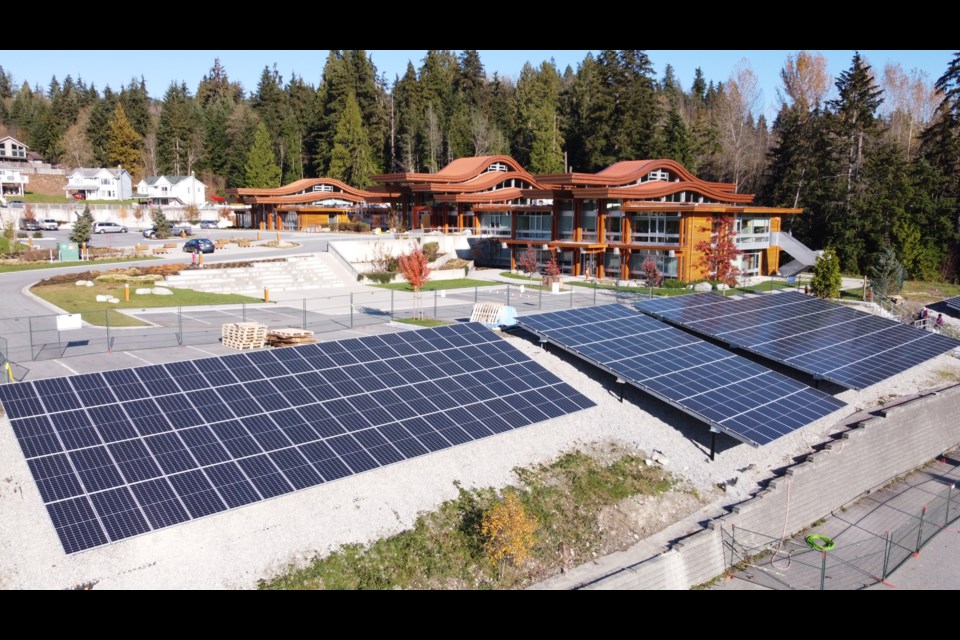Tsleil-Waututh Nation’s massive solar power project on its reserve on the North Shore has begun harnessing the power of the sun.
Construction on the solar project at the nation’s administrative building, at 3178 Alder Court in North Vancouver, which first broke ground in early August, was completed ahead of schedule and unveiled to the public on Nov. 26.
It’s the largest ground-mount solar project in Metro Vancouver to date.
The 341 solar panels, clustered in five south-facing arrays near the building’s parking lot, will generate 134 kilowatts of solar electricity and is hoped to supply all the building’s electrical needs.
Whonoak, Dennis Thomas, senior business development manager with TWN Economic Development, said the initiative is part of the nation’s commitment to reducing its carbon footprint, with the solar project set to help them step towards their goal of the administration and health building becoming net-zero energy.
“This project was really important to our nation because we as indigenous peoples have always been stewards of our land and water,” he said.
“This uses modern technology to sustain our buildings, both economically and environmentally.”
When it came to finding a way to generate as much power as the building consumes, there wasn’t enough wind to make turbines feasible, and tapping into the earth’s geothermal energy wasn’t an option because the administration building was already built.
But harnessing the sun’s natural power offered a realm of possibilities, said Thomas.
“I think any type of green energy should be discussed,” he said.
“This is just one type of green energy where we just happened to have a south-facing slope that was unused. So, we decided to convert it into a solar field, which happened to be perfect … because it would match the path of the sun.
“The natural elements of the sun will help create energy to offset the costs of our new administration office.”
The beauty of the plan is that the nation will be able to bank the solar credits it earns during the sunnier months to pay for the electricity it needs from BC Hydro in the winter. It’s estimated that the nation will be saving roughly $29,000 in annual electricity costs and that the panels will pay for themselves (but not the ancillary construction costs) in 12 years.
The nation started small with a solar project to power 90 per cent of its daycare centre’s electrical needs, and as part of the plans for the new administration building, the south-facing slope was left empty for the project.
Thomas began working with Terratek Energy, based in Vancouver, to come up with a plan to use the most high-tech solar power systems. With Phase 1 of construction, by Naikoon Contracting, now complete, the nation will move to Phase 2, which will include technology that reduces electrical consumption when the building isn’t in use.
“We still have to do an electrical audit on the building to make sure all of the electricity is being used properly and not being overused so we can minimise at an effective rate all the electricity used in the building,” Thomas said.
When calls for climate action are intensifying, Thomas said the nation could help lead the way forward.
“This is an initiative that can inspire hope and change in these current times and provide an educational awareness of green energy to our younger generations,” he said.
“In our indigenous communities, we always prepare and do what needs to be done for the future generations of our nation.
“For us to let our younger generations know that we are doing this now will only help benefit and create a positive movement forward which shows that we’re walking the walk and not just talking the talk.”
He said one of the nation’s goals was to eventually hold educational tours for schools in the area to learn more about green energy.
“I think if we continue this discussion in all different types of mediums, it’s only going to be beneficial for our future generations and the future of all of the North Shore,” Thomas said.
The project also came in under its budget of $600,000.
One-third of the project's cost was funded by the Northern Growth Foundation, the provincial government, under its Fraser Basin Council program and New Relationship trust. The nation funded the remainder.
Thomas said the nation was also working on other green energy initiatives that aren’t set in stone yet, that he looks forward to launching in the future.
“We’re trying to send a clear message to our surrounding neighbours that initiatives like this must be taken seriously,” he said.
“We need to be working collaboratively so that we can provide that platform for our younger generations to succeed.”
-- with files from Martha Perkins
Elisia Seeber is the North Shore News’ Indigenous and civic affairs reporter. This reporting beat is made possible by the Local Journalism Initiative.



